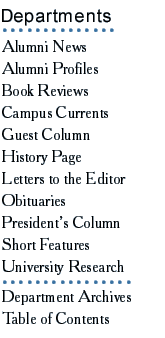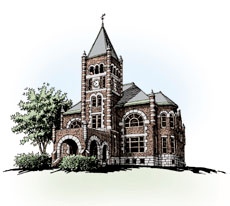

|

|

We Give Them the World By President Joan R. Leitzel Last October, I was invited to attend an international conference with a group of presidents of Romanian and American universities. It was a wonderful opportunity for two reasons. First, I expected the meeting itself would be significant, and second, I could take a detour to spend time with two groups of UNH students who were in Budapest, Hungary, for fall semester. The last time I had been to Hungary was in 1988 for a mathematics meeting at the Technical University of Budapest. At that time, Budapest, once a magnificent city, was in need of repair, with a substandard public transportation system and serious pollution. Now, with Hungary under a democratic government, the city seemed to be on the mend. I visited a group of UNH engineering and mathematics students who were studying at the Technical University. Another group of UNH social science and business students was at the Budapest University of Economic Sciences, together with sociology professor Michael Donnelly. In two short days, the students reintroduced me to Budapest. They talked about their academic experiences, their Hungarian friends, their acquaintances from all around the globe, the culture and current issues of Eastern Europe and their adventures in other countries. It was clear that they had mastered all the practical issues of currency, public transportation, computer access and shopping. We went to a performance of Mozart s Figaro at the magnificent opera house, and they told me about the many museums in Budapest. They were only halfway through the semester and had extensive plans for the coming weeks. In January, when they were back in Durham, I invited them to lunch. I asked them, Why should UNH students study abroad? These students said they had learned to handle difficult situations and to be comfortable in a new city a city where they needed to carry documentation authorizing them to be there. They said their teachers approached lesson material differently. Vicki Wood 01 of Claremont, N.H., explained that some of her Hungarian classmates were surprised when she and her roommate would write term papers in their own words rather than compile information from reference books or the Internet. In the future, they will be among the first in line to become leaders in a world made smaller by communications. Study abroad puts a human face on an unfamiliar culture. These students were pleased they had chosen to go to Eastern Europe. They saw first-hand the effects of communism on today s Hungary, and they experienced an emerging nation. Most were also able to take the time to travel to other countries and cities. They felt the intense nationalism of East European countries and became more tolerant and more respectful of differences. All the students I spoke with had developed a new self-confidence. As I spoke with them, I remembered my own first trip abroad. I studied in the Soviet Union between the time when I received my undergraduate degree and the beginning of graduate school. U.S.-Soviet relations were thawing the Iron Curtain was just opening a crack and the experience was life-changing. Like our UNH students, I returned with sharpened values and higher goals, an enriched appreciation for human differences and a deeper respect for international problems. Today, the university sponsors 16 study-abroad opportunities and makes dozens more available through association with other institutions. Most include enrollment at a foreign university where programs have been matched to ours. Some, but not all, require competence in another language. In our distinctive International Research Opportunities Program (IROP), UNH undergraduates go to other countries to conduct research after first studying the language, history and culture of the country where they will work. Each student has a UNH faculty supervisor and a foreign faculty mentor. This autumn the first IROP group returned to campus. The next group is preparing to leave late this spring. Tanzania, Finland, Australia: all around the globe they go. Our students who study abroad bring home much more than memories and postcards. Their experiences make them more engaged in an increasingly interconnected world. In the future, they will be among the first in line to become leaders in a world made smaller by communications. I am proud that UNH can give them the opportunity to prepare so well for this exciting and important part of their future. We'd like your opinion! Visit President Leitzel's home page. Archives of President Leitzel's columns. 9 Edgewood Road Durham NH 03824 (603) 862-2040 alumni@unh.edu |